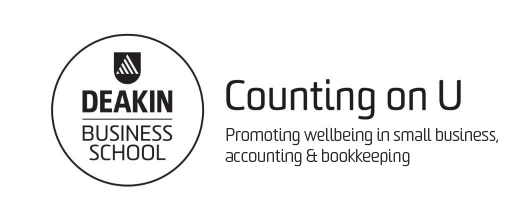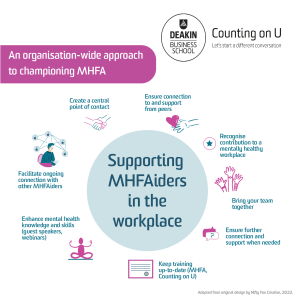Counting on U Newsletter #1 28/09/2022
Mental health training demands an organisation-wide approach
The ‘Great Resignation’ is a buzz-phrase that started filtering into global newsfeeds and headlines during 2021.
In the wake of the COVID-19 pandemic, this US-coined term flagged a movement among workers who were either quitting their jobs or pulling back from the hustle culture after re-evaluating the balance between work and wellbeing.
Whether it’s the ‘Great Resignation’ or the ‘Great Reshuffle’ it’s clear that wellbeing and mental health are now claiming a greater share of the spotlight for all sectors including business advisors and small business owners.
Mental wellbeing underpins the Counting on U Program, as we know that training staff in Mental Health First Aid (MHFA) is a key element in creating a safe, healthy workplace.
However, efforts to protect and promote mental health should not end there. To be effective, MHFA training needs to be implemented as part of a strategic, organisation-wide approach to wellbeing. Supporting mental health at work means creating an environment that is psychologically safe for everyone.
Dr Amy Edmondson from Harvard Business School defines psychological safety as a work climate where employees can speak up about ideas and concerns, free from interpersonal fears, risks, or consequences. Psychological safety is a culture created by a group to create a psychologically safe workplace and it means the entire workplace needs to be onboard.
So how is this achieved?
First, it’s important to understand that positive mental heath is not simply the responsibility of the Mental Health First Aider (or MHFA Officer). To perform their role effectively, they need the support of an organisational strategy that prioritises the mental health of employees and clients..
Too often MHFAiders return from their training to find a lack of ongoing support in their workplace. And when nothing is in place to support newly-accredited MHFAiders, the lack of guidance and advice diminishes their ability to look out for the wellbeing of clients and/or colleagues, and the entire process begins to feel like a tick-the-box exercise.
Here’s some of the ways an organisation can better support MHFA officers:
- create a central point of contact – a dedicated person to reach out to for coordination, debriefing and support
- ensure connection to and support from peers, and recognition that their contribution to a mentally healthy workplace is valued
- bring them together for regular meetings and connection
- ensure there is someone who can provide connection and support if issues need to be escalated
- keep their skills and accreditation up-to-date via MHFA refresher training
- enhance their knowledge and skills through guest speakers, webinars, and complementary training
- keep them connected with other, internal MHFAiders/MHFA Officers as well as MHFAiders external to the organisation.
For MHFAiders who work within micro/small businesses or for individual MHFAiders in general, support could be in the form of:
- debriefing or checking in with an accredited MHFA trainer via our new Counting on U 1:1 coaching sessions.
- implementing self-care strategies
- contacting your professional member body, some of whom provide members with access to wellbeing support services
Providing good mental health support in the workplace is more than just completing a course – it needs to be an integral part of your company culture.
By offering this support, workplaces can create a culture where everyone is able to better care for both clients and colleagues.
This article was written by Counting on U in collaboration with Mentally Well Workplaces.
The Counting on U newsletter with the latest news and updates, free resources, events and support from our partner network goes out every two months. Have you signed up to receive it?
Find out more about the 2023 CoU Program and register for training: The 2023 Program | Counting on U (deakin.edu.au)

